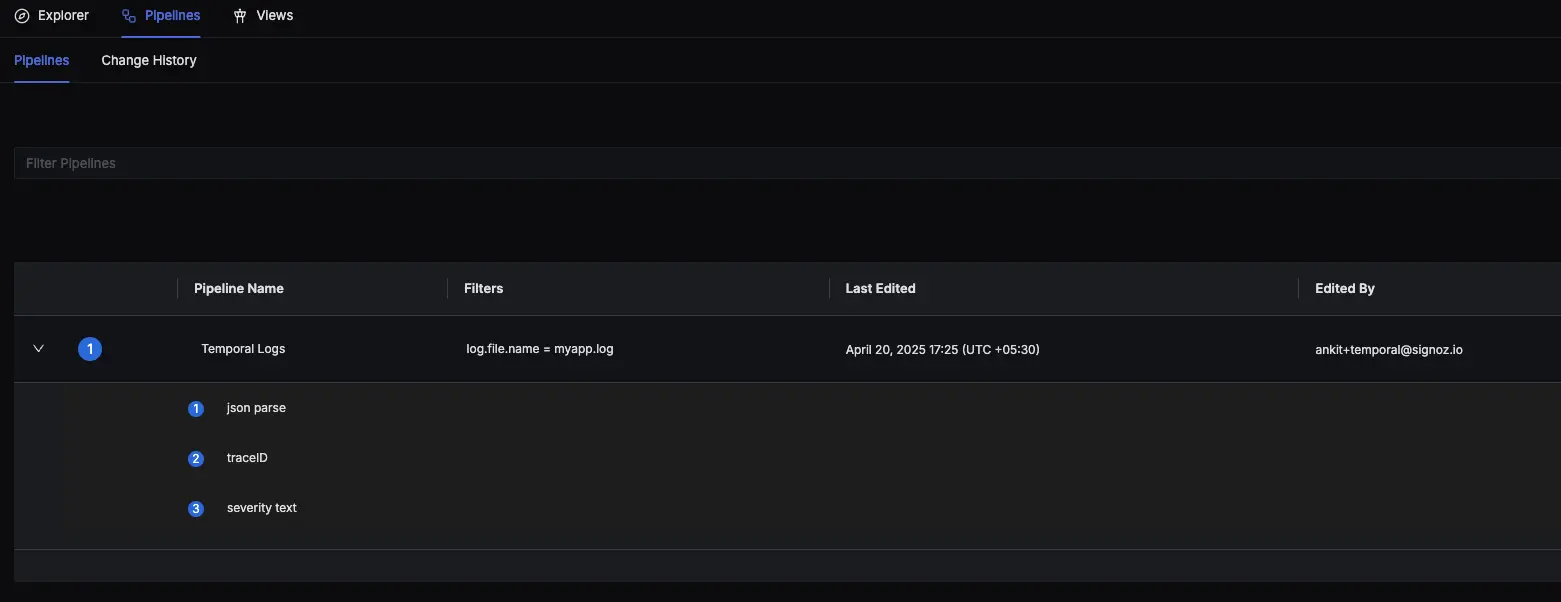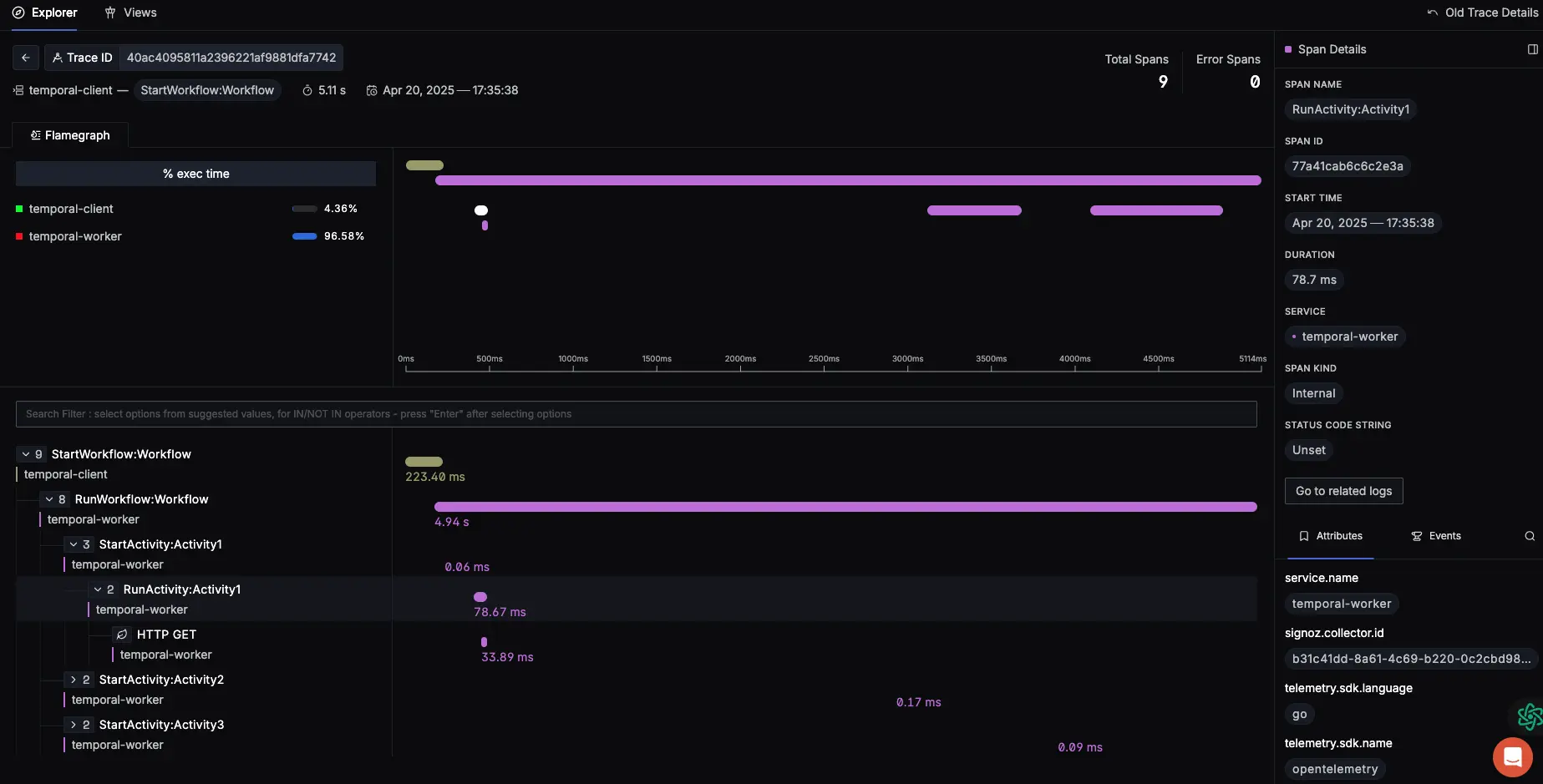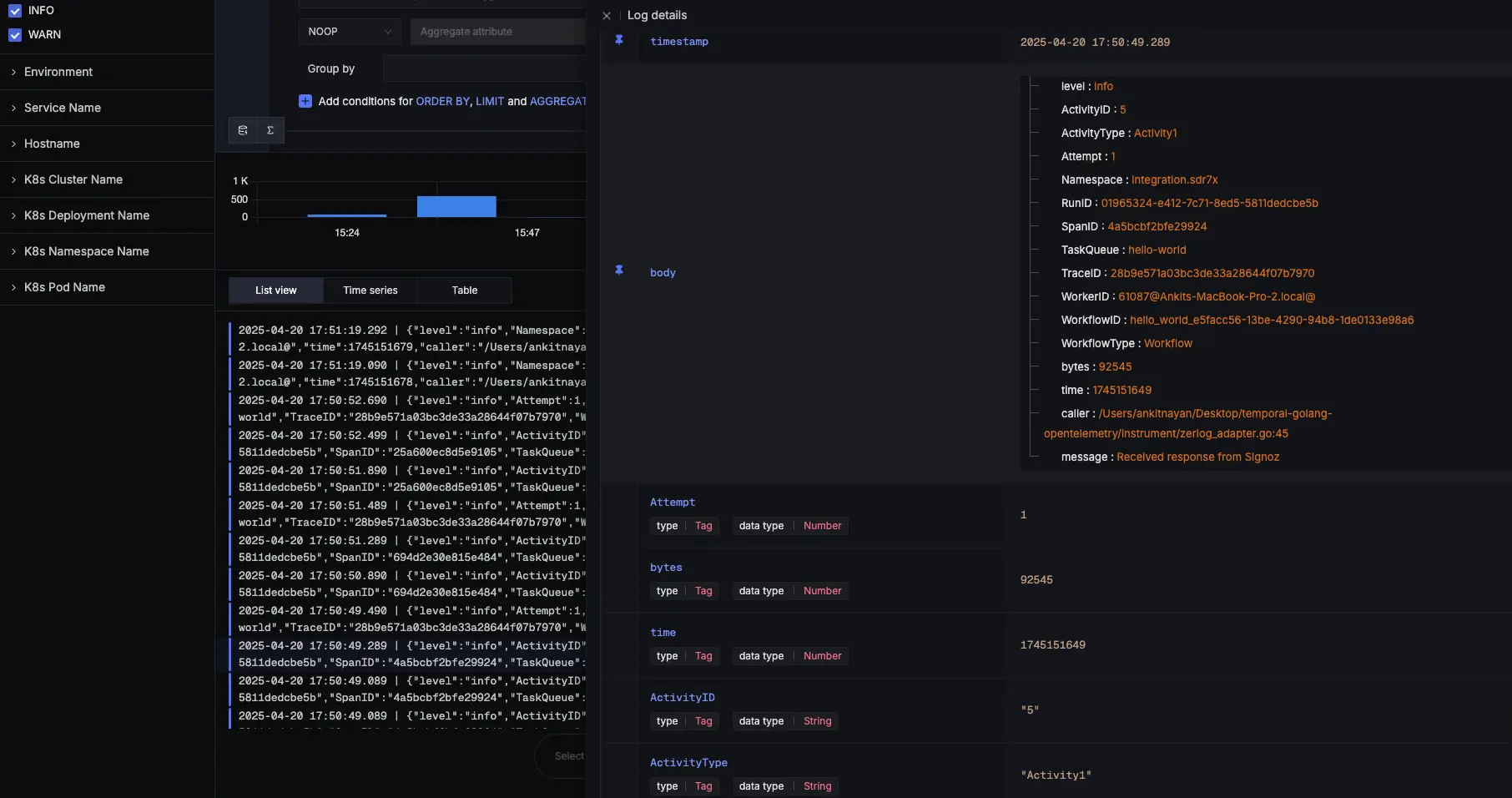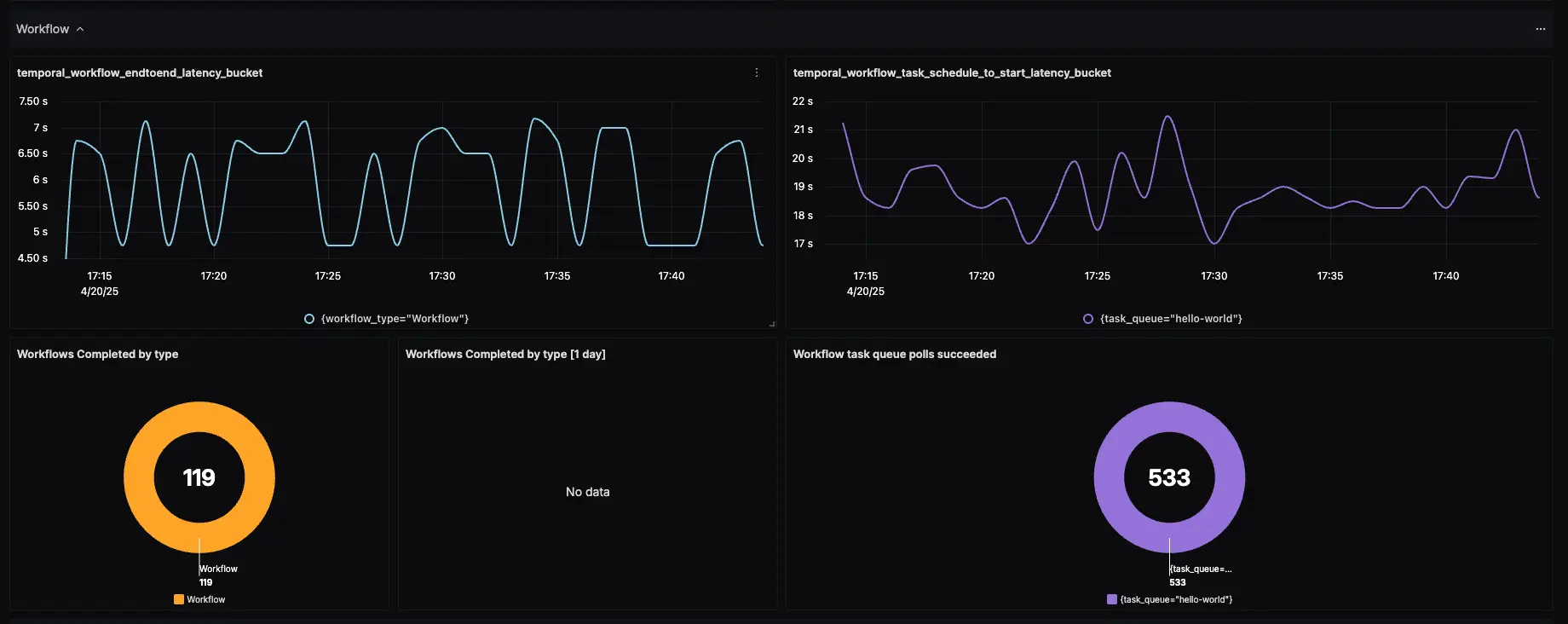We have published a helloworld temporal application and instrumented it using otel at https://github.com/SigNoz/temporal-typescript-opentelemetry. The README.md of the repo has instructions to run the application.
You should open the repo and browse the code and files as we go through the doc step by step.
Step 1: Add dependencies
"@opentelemetry/auto-instrumentations-node": "^0.55.0",
"@opentelemetry/core": "^1.30.0",
"@opentelemetry/exporter-metrics-otlp-grpc": "^0.57.0",
"@opentelemetry/exporter-trace-otlp-grpc": "^0.57.0",
"@opentelemetry/resources": "^1.30.0",
"@opentelemetry/sdk-metrics": "^1.30.0",
"@opentelemetry/sdk-node": "^0.57.0",
"@opentelemetry/sdk-trace-node": "^1.30.0",
"@opentelemetry/semantic-conventions": "^1.28.0",
"@opentelemetry/winston-transport": "^0.11.0",
"@temporalio/activity": "^1.11.6",
"@temporalio/client": "^1.11.6",
"@temporalio/interceptors-opentelemetry": "^1.11.7",
"@temporalio/worker": "^1.11.6",
"@temporalio/workflow": "^1.11.6",
Step 2: Configure OpenTelemetry SDK
Source code reference: instrumentation.ts. Create src/instrumentation.ts to configure the OpenTelemetry SDK and initialize tracing and metrics for your Temporal application:
// OpenTelemetry's Node.js documentation recommends to setup instrumentation from a
// dedicated file, which can be required before anything else in the application;
// e.g. by running node with `--require ./instrumentation.js`. See
// https://opentelemetry.io/docs/languages/js/getting-started/nodejs/#setup for details.
import { config } from 'dotenv';
config(); // Load environment variables before anything else
/* eslint-disable @typescript-eslint/no-unused-vars */
import { NodeSDK } from '@opentelemetry/sdk-node';
import { SpanExporter } from '@opentelemetry/sdk-trace-node';
import { OTLPTraceExporter as OTLPTraceExporterGrpc } from '@opentelemetry/exporter-trace-otlp-grpc';
import { OTLPMetricExporter as OTLPMetricExporterGrpc } from '@opentelemetry/exporter-metrics-otlp-grpc';
import { OTLPLogExporter as OTLPLogExporterGrpc } from '@opentelemetry/exporter-logs-otlp-grpc';
import { MetricReader, PeriodicExportingMetricReader } from '@opentelemetry/sdk-metrics';
import { getNodeAutoInstrumentations } from '@opentelemetry/auto-instrumentations-node';
import { Resource, detectResourcesSync } from '@opentelemetry/resources';
import { envDetector, hostDetector, osDetector, processDetector } from '@opentelemetry/resources';
// /* eslint-enable @typescript-eslint/no-unused-vars */
import { DiagConsoleLogger, DiagLogLevel, diag } from '@opentelemetry/api';
// diag.setLogger(new DiagConsoleLogger(), DiagLogLevel.DEBUG);
// Function to parse headers from OTEL_EXPORTER_OTLP_HEADERS
function parseHeaders(headersString: string | undefined): Record<string, string> {
if (!headersString) return {};
const headers: Record<string, string> = {};
const pairs = headersString.split(',');
pairs.forEach((pair) => {
const [key, value] = pair.split('=');
if (key && value) {
headers[key.trim()] = value.trim();
}
});
return headers;
}
// Parse headers from the environment variable
export const otlpHeaders = parseHeaders(process.env.OTEL_EXPORTER_OTLP_HEADERS);
// Function to parse OTEL_RESOURCE_ATTRIBUTES into an object
function parseResourceAttributes(attributesString: string | undefined): { [key: string]: string } {
if (!attributesString) return {};
const attributes: { [key: string]: string } = {};
const pairs = attributesString.split(',');
pairs.forEach((pair) => {
const [key, value] = pair.split('=');
if (key && value) {
attributes[key] = value;
}
});
return attributes;
}
// Parse resource attributes from environment variable
const resourceAttributesString = process.env.OTEL_RESOURCE_ATTRIBUTES;
const parsedAttributes = parseResourceAttributes(resourceAttributesString);
// Set service name from environment or use default
const serviceName = process.env.OTEL_SERVICE_NAME || 'default-temporal-service';
// console.log('Setting service name to:', serviceName);
// Create resource attributes with service name
const resourceAttributes = {
'service.name': serviceName,
...parsedAttributes
};
// Detect resources using built-in detectors
const detectedResources = detectResourcesSync({
detectors: [
envDetector,
hostDetector,
osDetector,
processDetector
]
});
// Filter out process.pid from the detected resources
const filteredAttributes = { ...detectedResources.attributes };
delete filteredAttributes['process.command_args'];
const filteredResources = new Resource(filteredAttributes);
// Create final resource by merging detected resources with custom attributes
export const resource = new Resource(resourceAttributes).merge(filteredResources);
function setupTraceExporter(): SpanExporter | undefined {
return new OTLPTraceExporterGrpc({
headers: otlpHeaders,
timeoutMillis: 10000,
});
}
function setupMetricReader(): MetricReader | undefined {
return new PeriodicExportingMetricReader({
exporter: new OTLPMetricExporterGrpc({
headers: otlpHeaders,
timeoutMillis: 10000,
}),
});
}
export const traceExporter = setupTraceExporter();
const metricReader = setupMetricReader();
export const otelSdk = new NodeSDK({
// This is required for use with the `@temporalio/interceptors-opentelemetry` package.
resource,
// This is required for use with the `@temporalio/interceptors-opentelemetry` package.
traceExporter,
// This is optional; it enables collecting metrics about the Node process, and some other libraries.
// Note that Temporal's Worker metrics are controlled through the Runtime options and do not relate
// to this option.
metricReader,
// This is optional; it enables auto-instrumentation for certain libraries.
instrumentations: [getNodeAutoInstrumentations()],
});
try {
otelSdk.start();
diag.info(`[TELEMETRY] OpenTelemetry SDK initialized successfully ...`);
} catch (error) {
diag.error(`[TELEMETRY] Failed to initialize OpenTelemetry SDK: ${error}`);
throw error;
}
This interceptor enables automatic tracing and metrics collection for your Temporal workflows.
Step 3: Add OpenTelemetry Interceptor to the client code
Source code reference: client.ts.
Add the OpenTelemetry interceptor to your Temporal client configuration:
import { otelSdk } from './instrumentation'; // this must be the first line of import
...
...
import { OpenTelemetryWorkflowClientInterceptor } from '@temporalio/interceptors-opentelemetry';
const client = new Client({
// ... other client config ...
interceptors: {
workflow: [new OpenTelemetryWorkflowClientInterceptor()],
},
});
Make sure to import instrumentation.ts as the first line in your imports else other auto-instrumentations might not work.
import { otelSdk } from './instrumentation';
Also, gracefully shutdown otelSDK in your code using something like
finally {
await otelSdk.shutdown();
}
This interceptor enables automatic tracing and metrics collection for your Temporal workflows.
Step 4: Configure Temporal Worker Code
Source code reference: worker.ts.
Add OpenTelemetry instrumentation to your worker:
import { otelSdk, otlpHeaders, resource, traceExporter } from './instrumentation'; // this must be the first line of import
import { DefaultLogger, makeTelemetryFilterString, NativeConnection, Runtime, Worker } from '@temporalio/worker';
import { getConnectionOptions } from './connection';
import {
OpenTelemetryActivityInboundInterceptor,
OpenTelemetryActivityOutboundInterceptor,
makeWorkflowExporter,
} from '@temporalio/interceptors-opentelemetry/lib/worker';
import { OTEL_EXPORTER_OTLP_ENDPOINT, OTEL_EXPORTER_OTLP_METRICS_ENDPOINT, otelSdk, otlpHeaders, resource, traceExporter } from './instrumentation';
import { MetricReader } from '@opentelemetry/sdk-metrics';
import { logger } from './logger';
function initializeRuntime() {
Runtime.install({
logger,
telemetryOptions: {
metrics: {
otel: {
url: OTEL_EXPORTER_OTLP_ENDPOINT,
headers: otlpHeaders,
metricsExportInterval: 10000,
},
},
logging: {
forward: {},
filter: makeTelemetryFilterString({ core: 'INFO', other: 'INFO' }),
},
},
});
}
async function run() {
initializeRuntime();
...
...
try {
worker = await Worker.create({
// ... other worker config ...
sinks: traceExporter && {
exporter: makeWorkflowExporter(traceExporter, resource),
},
interceptors: traceExporter && {
workflowModules: [require.resolve('./workflows')],
activity: [
(ctx) => ({
inbound: new OpenTelemetryActivityInboundInterceptor(ctx),
outbound: new OpenTelemetryActivityOutboundInterceptor(ctx),
}),
],
},
});
} catch (err) {
// ... error handling ...
} finally {
await otelSdk.shutdown();
}
}
Make sure to import instrumentation.ts as the first line in your imports else other auto-instrumentations might not work.
This configuration enables OpenTelemetry instrumentation for both workflow and activity telemetry in your Temporal worker.
Step 5: Configure Temporal Workflow Code
Source code reference: workflows.ts.
Add OpenTelemetry interceptors to your workflow code:
import { WorkflowInterceptorsFactory } from '@temporalio/workflow';
import {
OpenTelemetryInboundInterceptor,
OpenTelemetryOutboundInterceptor,
OpenTelemetryInternalsInterceptor,
} from '@temporalio/interceptors-opentelemetry/lib/workflow';
import { log } from '@temporalio/workflow';
// ... other workflow config ...
export const interceptors: WorkflowInterceptorsFactory = () => ({
inbound: [new OpenTelemetryInboundInterceptor()],
outbound: [new OpenTelemetryOutboundInterceptor()],
internals: [new OpenTelemetryInternalsInterceptor()],
});
These interceptors enable telemetry collection for inbound signals, outbound activities, and internal workflow operations.
Step 6: Configure logger
Source code reference: logger.ts.
Connect winston logger with temporal logger and otel logger
import { otlpHeaders, resource } from './instrumentation'; // this must be the first line of import
import winston, { transports } from 'winston';
import { OTLPLogExporter as OTLPLogExporterGrpc } from '@opentelemetry/exporter-logs-otlp-grpc';
import { logs } from '@opentelemetry/api-logs';
import { LoggerProvider } from '@opentelemetry/sdk-logs';
import { SimpleLogRecordProcessor } from '@opentelemetry/sdk-logs';
import { Logger } from '@temporalio/common';
import { OpenTelemetryTransportV3 } from '@opentelemetry/winston-transport';
// Initialize the Logger provider
const loggerProvider = new LoggerProvider({
resource,
})
// Configure OTLP exporter for SigNoz using gRPC
const otlpExporter = new OTLPLogExporterGrpc({
headers: otlpHeaders
})
// Add processor with the OTLP exporter
loggerProvider.addLogRecordProcessor(new SimpleLogRecordProcessor(otlpExporter))
// loggerProvider.addLogRecordProcessor(new BatchLogRecordProcessor(otlpExporter))
logs.setGlobalLoggerProvider(loggerProvider);
const otlp_logger = loggerProvider.getLogger('default', '1.0.0');
const winstonLogger = winston.createLogger({
level: 'info',
format: winston.format.json(),
transports: [
new transports.Console(),
new OpenTelemetryTransportV3(),
],
});
export const logger: Logger = {
trace: (...args) => winstonLogger.debug(...args),
debug: (...args) => winstonLogger.debug(...args),
info: (...args) => winstonLogger.info(...args),
warn: (...args) => winstonLogger.warn(...args),
error: (...args) => winstonLogger.error(...args),
log: (level, message, ...args) => {
otlp_logger.emit({
// severityNumber: 16,
severityText: level,
body: message,
// attributes: args[0] || {},
attributes: Object.assign({}, ...args),
});
// console.log(`Message: ${message}, Level: ${level}, Attributes: ${JSON.stringify(Object.assign({}, ...args))}`);
return (winstonLogger as any)[level]?.(...args) || winstonLogger.info(...args)
}
};
Step 7: Running your temporal worker and client applications
Pass serviceName, otlp endpoint and authentication headers using native otel environment variables. You can add more resource attributes like deployment.environment as per otel conventions using envs
Worker run command:
OTEL_RESOURCE_ATTRIBUTES="service.name=temporal-worker-<identifier>,deployment.environment=test" OTEL_EXPORTER_OTLP_ENDPOINT='http://localhost:4317' npm run start
A similar run command for temporal client application
OTEL_RESOURCE_ATTRIBUTES="service.name=temporal-client-<identifier>,deployment.environment=test" OTEL_EXPORTER_OTLP_ENDPOINT='http://localhost:4317' npm run workflow
Worker run command:
OTEL_EXPORTER_OTLP_ENDPOINT='https://ingest.<region>.signoz.cloud:443' OTEL_RESOURCE_ATTRIBUTES="service.name=temporal-worker-<identifier>" OTEL_EXPORTER_OTLP_HEADERS="signoz-ingestion-key=<signoz-ingestion-key>" npm run start
A similar run command for temporal client application
OTEL_EXPORTER_OTLP_ENDPOINT='https://ingest.<region>.signoz.cloud:443' OTEL_RESOURCE_ATTRIBUTES="service.name=temporal-client-<identifier>" OTEL_EXPORTER_OTLP_HEADERS="signoz-ingestion-key=<signoz-ingestion-key>" npm run workflow
This should start sending your sdk metrics, traces and logs to the otel-collector.
Winston is configured to send logs directly to signoz cloud. In most cases, the logs are output to file and the logs are read by otel-collector and pushed to signoz cloud using
- Adding a filelog receiver at otel-collector following https://signoz.io/docs/userguide/collect_logs_from_file/
- Collecting k8s logs following https://signoz.io/docs/userguide/collect_kubernetes_pod_logs/
To setup otel-collector, read:
- For VM => https://signoz.io/docs/tutorial/opentelemetry-binary-usage-in-virtual-machine/
- For K8s => https://signoz.io/docs/tutorial/kubernetes-infra-metrics/
Step 8: Build dashboards and parse logs at SigNoz
You should be able to see incoming temporal sdk metrics at Metrics Explorer page at SigNoz. Once you see them coming, go to Dashboards -> Import Dashboard. The dashboard json for sdk metrics can be found at this link
If you are successfully sending logs to SigNoz, you need to parse your logs at SigNoz using the Logs Pipeline feature.
- Use Json parser if your logs are json formatted using https://signoz.io/docs/logs-pipelines/processors/#json-parser
- Map traceID and spanID to the right fields using trace parser using https://signoz.io/docs/logs-pipelines/processors/#trace-parser. This helps you to move seamlessly between logs and traces
- Map log_level to severity_text in otel semantics using https://signoz.io/docs/logs-pipelines/processors/#severity-parser
- (Optional) Map timestamp from your json body to otel using https://signoz.io/docs/logs-pipelines/processors/#timestamp-parser

Step 6: Enjoy your data at SigNoz. Metrics, Traces and Logs all at the same tool for unified querying and correlation



